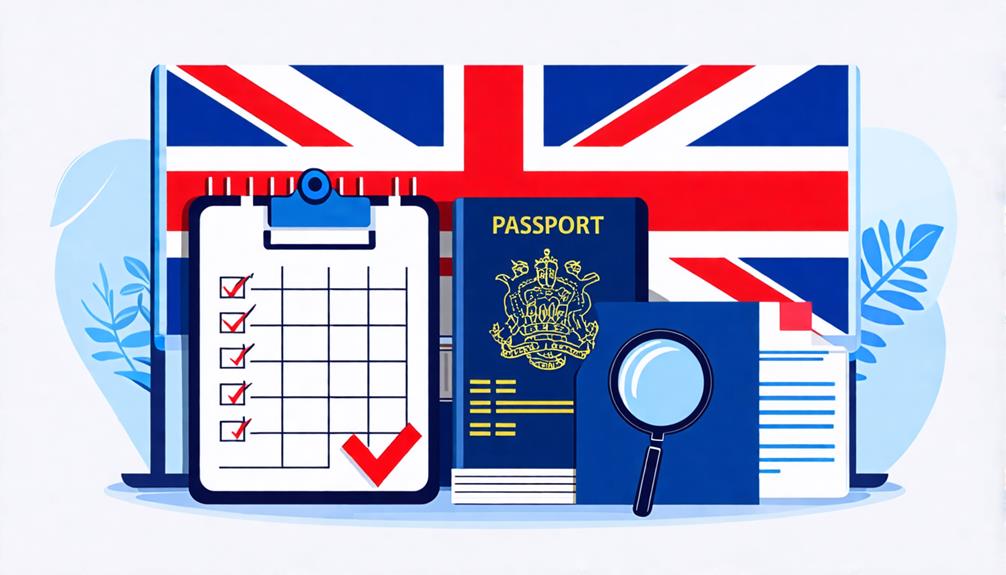The process of renewing your UK BPSS clearance is a key step for maintaining your eligibility for roles in the public sector.
Begin by verifying your eligibility and ensuring all your documents, including identification and employment history, are current.
Fill out a detailed Security Questionnaire with accurate personal and professional data.
Your sponsor is required to initiate the necessary checks and submit a Security Appraisal Form to comply with GDPR regulations.
Be prepared for comprehensive background checks, which include Right to Work, identity verification, and criminal records, followed by a processing time of 5-10 working days.
Knowing each step in detail will aid in a smooth BPSS renewal.
Confirm Eligibility
Verifying eligibility for the renewal of your UK BPSS clearance is an important initial step to ensure adherence to security protocols and access to sensitive government assets.
The Baseline Personnel Security Standard (BPSS) is a mandatory requirement for all civil servants, members of the armed forces, temporary staff, and government contractors working in roles that involve handling sensitive information or accessing governmental assets. This standard ensures that individuals meet the required security standards.
To verify eligibility, it is necessary to check that your employment history and identity documentation are up to date. These factors are foundational to the renewal process. Significant gaps or inaccuracies in your employment records could risk your eligibility status.
Additionally, any extended periods spent abroad, particularly those exceeding six months, must be disclosed. This is important because undisclosed foreign travels could raise security concerns and impact your clearance status.
Every organization may have its specific procedures for verifying BPSS eligibility, so consulting with your Human Resources (HR) or security officer for guidance tailored to your role is recommended. They can provide exact instructions and any additional requirements relevant to your organization's policies, ensuring a seamless and compliant renewal process.
Complete Documentation
When the renewal of your UK BPSS clearance is confirmed, you must gather and fill out the necessary documentation to support the application. It is important for employers to verify that all provided details are correct and current, reflecting any changes in personal circumstances since the initial clearance.
The documents required include identification proofs such as passports or driving licenses, and proof of address documents like utility bills or bank statements. It may also be necessary to provide employment history records, including references, to validate the individual's background. Some employers may choose to conduct additional checks, like credit and reference checks, to further confirm the applicant's suitability.
All documentation must comply with GDPR regulations, meaning data should be stored securely and be accessible only to authorized personnel. If available, the BPSS Verification Record, which gives the results of previous checks, should also be included. This record makes it easier to transfer BPSS clearance between employers without needing to conduct a re-verification.
The BPSS process usually takes between 5 to 10 working days, based on the extent of the checks and the efficiency of the organization. Correct documentation is key to ensuring an efficient and timely renewal process.
Submit Security Questionnaire
The Security Questionnaire plays a key role in the renewal process of the BPSS, necessitating applicants to furnish comprehensive and accurate data about their personal and professional background. This part of the process is crucial for a comprehensive background assessment, confirming an individual's suitability for security roles within the UK.
Accuracy and honesty in filling out the Security Questionnaire is of utmost importance, as any inconsistencies or omissions can lead to the rejection or revocation of your clearance. The questionnaire generally includes sections on personal history, employment specifics, and any criminal records. This level of detail is required for the sponsoring authority to confirm the applicant's suitability for roles that require BPSS clearance.
After submission, the Security Questionnaire is subject to a detailed examination by the sponsoring authority. This examination is a critical part of the process, verifying that the information provided meets the criteria for security clearance. It is only after the successful completion and submission of this questionnaire that the vetting process, conducted by the United Kingdom Security Vetting unit (UKSV), can commence.
Sponsor Initiation
Sponsors have a key role in the renewal of UK BPSS clearance. They commence the procedure by confirming eligibility and role requirements.
The process contains numerous steps, such as carrying out initial checks and filling out the required Security Appraisal Form.
The sponsors must fulfil particular criteria and comply with GDPR regulations to ensure the safe management of applicants' personal data.
Sponsor Eligibility Criteria
To start the BPSS clearance process, a sponsor needs to meet certain eligibility rules. Usually, this person is an HR representative or company security officer. They play a key role in validating the role requirements and conducting the necessary checks before a person can be considered for BPSS clearance. Civil servants and members of HM Forces have specific sponsors, while contractors need the organization requiring the clearance to act as their sponsor.
The tasks of the sponsor go beyond the initial clearance process. They have to manage the security clearance, including being aware of any changes in the personal circumstances of the person being vetted, as such changes could affect the validity or status of the BPSS clearance.
The role of a sponsor is not just procedural but also involves ongoing oversight and compliance. The sponsor must ensure that the clearance process meets security requirements and is ready to handle any issues that may occur during or after the vetting process.
Understanding these responsibilities and criteria is key to maintaining the integrity of the BPSS clearance system and ensuring that only suitable individuals are granted access to sensitive roles.
Initiation Process Steps
Sponsors, playing a key role in the validation and oversight of security clearances, start the renewal process by affirming the need for renewal based on the individual's present role and access needs. This significant step involves the organization's sponsor, often an HR representative or a company security officer, undertaking a new Baseline Personnel Security Standard (BPSS) check. The aim of this check is to assure the ongoing eligibility of the applicant for the needed security clearance.
The BPSS renewal initiation requires the sponsor to collect and submit necessary documentation, such as identity verification and work history. In addition, the applicant has to provide any new information about their right to work status and disclose any substantial changes in personal circumstances since their last clearance. This helps in ensuring the security checks are comprehensive and current.
Once the renewal process begins, the BPSS checks usually take between 5 to 10 working days to finish, although this schedule can change based on the organization's specific procedures. This methodical process assures that all required security measures are upheld and the individual's clearance is renewed without needless delays.
Background Checks
The process of renewing UK BPSS clearance involves comprehensive background checks.
These checks pay attention to key elements like Right to Work, identity verification, criminal record checks, and validation of employment history for the previous three years.
The identity verification process plays a significant role in confirming the authenticity and legal compliance of the individual's credentials.
All these steps play a foundational role in preserving the integrity and security of government operations.
Essential BPSS Components
The comprehensive BPSS clearance procedure includes four major background checks: Right to Work, identity verification, criminal record evaluations, and employment history inspections of the previous three years. These components are designed to ensure that individuals in sensitive roles are reliable and eligible to work in the UK.
Right to Work checks affirm an individual's eligibility, maintaining compliance with immigration laws. This step is vital as it protects organizations from legal consequences and upholds workforce integrity.
Criminal record evaluations, another primary component, examine any unspent convictions to judge the individual's suitability for roles that demand a high level of trust.
Employment history inspections cover the previous three years and include:
- Revelation of significant periods spent abroad, especially those over six months, to evaluate risks associated with foreign influence or actions.
- Examination of employment gaps to authenticate periods of unemployment and confirm no undisclosed activities.
- Confirmation of previous employment details to validate the accuracy of the applicant's work history.
Every organization may adopt custom methods for conducting these checks, but adherence to these standardized measures is required by the government. Compliance with these guidelines ensures that individuals in sensitive roles have been adequately vetted for security and reliability.
Identity Verification Process
What methods can organizations employ to ensure the precision and validity of an individual's identity during the BPSS clearance process? The process of verifying identity is a critical part of the Baseline Personnel Security Standard (BPSS) checks, confirming an individual's identity against official records. This usually includes cross-checking government records, employment history, and national databases to thoroughly review the candidate's background.
An essential part of identity verification includes disclosing any significant periods spent overseas. These periods need to be thoroughly investigated to confirm there are no gaps in the individual's background that could pose risks.
Organizations may also use more advanced security measures, such as biometric checks or third-party identity verification services, to strengthen the process's integrity.
For the prevention of risks associated with hiring individuals who will have access to sensitive government assets, thorough and accurate identity verification is key. By sticking to strict verification protocols, organizations can defend against potential security breaches and ensure that only individuals who can be trusted are given clearance.
This careful approach not only protects sensitive information but also supports the necessary security framework for maintaining public trust and national security.
Await Approval
After you've applied for your BPSS clearance, you can expect a processing time of around 5-10 working days, depending on the speed and thoroughness of the checks completed by the organization. It's important to keep lines of communication open with your sponsor during this time, as they may need additional documents or clarification to speed up the process.
While you're waiting for approval, you should be aware of the following:
- No Formal Certificate: BPSS results are not provided in the form of a formal certificate. Instead, you'll receive a BPSS Verification Record, which your employer is responsible for keeping safe.
- Eligibility Concerns: If any new information comes to light that could call into question your eligibility, this should be reported to the United Kingdom Security Vetting unit (UKSV) as soon as possible to avoid complications.
- Work Restrictions: Do not start any role that requires BPSS clearance until you've had confirmation of your clearance status. Starting such roles too early could lead to issues with compliance.
This waiting period may seem uncertain, but by following these guidelines you can ensure that the process runs smoothly and that potential issues are dealt with proactively. By staying informed and prepared, you make the transition to your new or renewed role easier.
Conclusion
The process of renewing UK BPSS clearance requires a systematic approach. It starts with confirming eligibility, followed by meticulous documentation.
The next step is to fill out a security questionnaire, which is initiated by a sponsor. A comprehensive background check is also necessary.
Each of these steps is significant to comply with security protocols and uphold the integrity of the clearance process. Navigating these stages successfully will result in the approval of BPSS clearance.
The renewal procedure emphasizes the value of diligence and precision. This rigorous process verifies that individuals satisfy the standards needed for security clearance.



